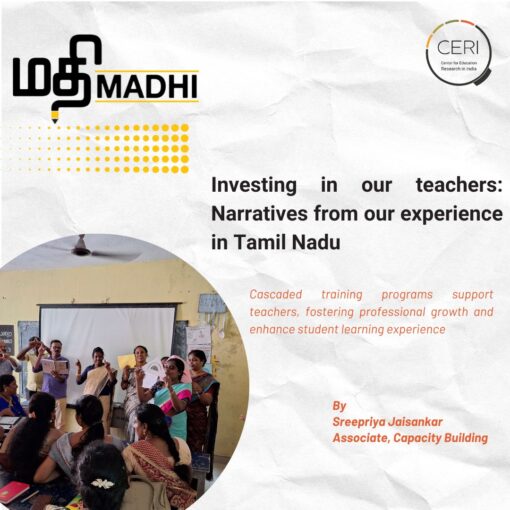
Investing in our teachers: Narratives from our experience in Tamil Nadu
The United Nations defines capacity-building as “a process of developing and strengthening the skills, instincts, abilities, processes, and resources that organisations and communities need to survive, adapt, and thrive in a fast-changing world. An essential ingredient in capacity-building is a transformation that is generated and sustained over time from within; transformation of this kind goes beyond performing tasks to changing mindsets and attitudes”. In the context of schools, capacity building plays a critical role in the learning and development of school leaders, teachers, and students to adapt to the changes in the learning ecosystem.
Challenges in the Indian Education System:
In India, there are 1.5 million schools and over 8 million teachers, yet educational quality is dismal due to inadequate infrastructure and a shortage of qualified and well-trained educators. Teacher training is essential for quality education, influencing both pedagogy and technology.
Ennum Ezhuthum Mission in Tamil Nadu:
With the vision of enhancing the quality of foundational education, the Department of School Education, Government of Tamil Nadu, initiated the Ennum Ezhuthum Mission, focusing on improving foundational learning among primary school children. This project, introduced in the academic year 2022-23, aims to ensure that by 2025, all students aged eight can read and write with comprehension, and acquire critical basic arithmetic skills. One of the key components of this multi-faceted programme is providing in-service teacher training.
Structured Teacher Training Programs:
The Ennum Ezhuthum Mission impacts over one lakh primary school teachers across grades 1, 2, and 3. To ensure effective teacher training, the School Education Department adopts a cascaded training model conducted at State, District, and Block levels. The Academic Resource Group of Ennum Ezhuthum Mission is responsible for designing teaching-learning materials and conducting training programs at the State level. Following a substantial refinement of curricular materials under the Mission, the focus shifted to orienting teachers on the content. This approach facilitates the dissemination of content to a large, geographically dispersed group of primary teachers within a compressed time frame of 2-3 days.
Data-Driven Evaluation:
The effectiveness of the training programs is rigorously evaluated through a tiered data collection model. Observation forms, participant feedback, and quizzes are used to assess the facilitation quality and content absorption at all three (district, block and cluster) training levels. This data-driven approach allows for effective diagnosis of breakdowns and enables course correction.
Addressing Content Dilution:
A significant challenge in cascaded training programs is the potential dilution of content quality as it reaches the last workforce level, where its impact is most crucial. To maintain uniformity across the three levels and address facilitation capacity gaps, a video covering essential knowledge and skills is played at each training centre. Yet, it’s essential to recognise that the video’s ability to influence teachers’ mindsets depends on the quality of subsequent activities, demonstrations, and discussions. State and district-level participants, serving as resource persons for the next level, significantly impact the learning experience through their facilitation skills. Fostering mindset changes and skill development hinges on their ability to pose impactful questions, moderate discussions, and facilitate reflection. In this transformative journey, the question arises: can we build the capacity to instigate attitude and mindset changes?
Building Mindset Change and Skill-Building:
Shifting teachers’ mindsets to align with new classroom learning approaches is imperative. Hence, honing pedagogical skills tailored to such learning is crucial. For instance, cultivating a growth mindset through effective feedback can boost student motivation and create a positive learning environment. While the teacher handbook outlines activity procedures, teachers excelling in subject-specific competencies enhance learning by understanding the rationale behind these steps. Skill-building sessions, incorporating learning, discussion, application, and reflection, can significantly impact the quality of instructional delivery in the classroom. Orientation to better understand the use of teacher handbooks and student workbooks is vital, especially in a state-wide mission where changes are continuous during the first few years of mission roll-out. Striking a balance between orientation and attitude building is key.
Continuous Improvement through observations:
Observation data serves as a lever for identifying effective execution strategies, and training administrators play a key role in this process. Developing a quiz that evaluates the absorption of knowledge, depth of understanding, and application skills is essential. In cases where feedback data and observation form data diverge, the quiz results can provide valuable insights into areas for improvement. Administering prework to participants before the training program, based on the session’s subject, reduces the need for extensive guidance, allowing more room for practice, reflection, and planning. Designing spaces for teachers that encourage group or individual learning rather than just instruction ensures effective processing and application of the training inputs. The utilisation of Cluster Resource Centres can play an active role in creating this conducive learning environment.
By adopting a holistic approach to teacher capacity-building, the Ennum Ezhuthum Mission in Tamil Nadu exemplifies a transformative initiative. Emphasising continuous improvement, data-driven evaluations, and a focus on changing mindsets, this program sets a benchmark for effective teacher training in the Indian education system. Through strategic interventions and a commitment to professional development, the Ennum Ezhuthum Mission aims to bring about a positive and lasting change in the landscape of primary education in Tamil Nadu.
